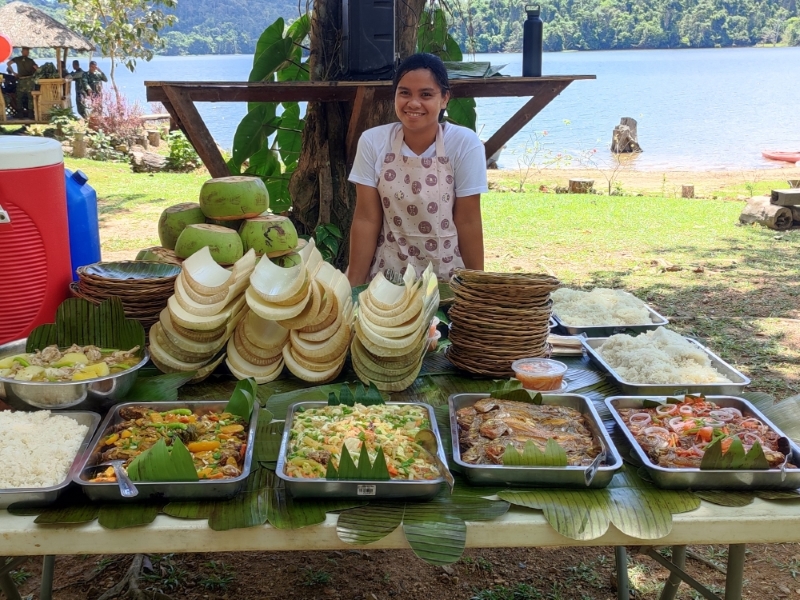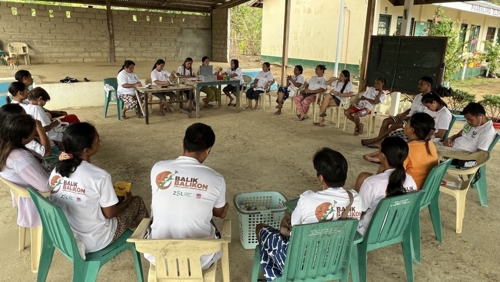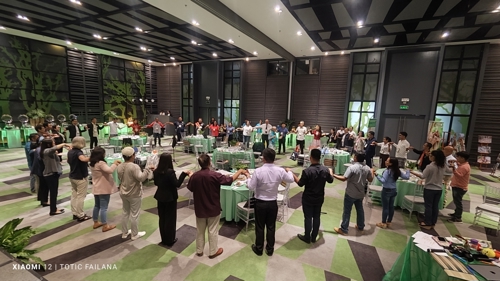The transformative power of local engagement

Ester Bacud while preparing the foods during the World Pangolin Day in February 2023 celebration in Lake Manguao, Poblacion, Taytay, Palawan. Credit - Ronald L. Amada.
Empowering communities: The transformative power of local engagement in conservation of the Philippine pangolin
Endemic to Palawan, the Critically Endangered Palawan pangolin (Manis culionensis) faces severe population declines (estimated at >80% for 2012-2033) due to illegal trade. Despite international and national bans on trade and collection, poaching continues.
In 2021, when our project began, communities in Lake Manguao (Taytay) and Barangay Teneguiban (El Nido) lacked opportunities for sustainable resource management and combating illegal wildlife trade (IWT). Both sites suffered from illegal extraction and wildlife depletion, including of pangolins, due to ineffective management and collaboration. With 67% of locals living below the poverty line and about 10% poaching pangolins, traders exploited locals by offering minimal compensation for pangolin meat, which sold for much higher prices outside Palawan.

Our project aimed to change community behaviour towards wildlife conservation and improve enforcement capabilities. We trained and mobilised local community members, engaging former poachers in conservation activities. By hiring ex-poachers as guides for our camera trap survey and involving them in the forest wardens’ programme, we provided alternative livelihoods and integrated their knowledge into conservation efforts.
We focused on protecting two key Palawan pangolin populations by developing community-led conservation models in Local Pangolin Conservation Areas (LPCA). This model empowered communities to manage resources, linked conservation to financial benefits, increased social benefits from pangolin stewardship, and strengthened enforcement against poaching and IWT. Following recommendations from the 2018-2043 Palawan Pangolin National Conservation Strategy, we expanded successful initiatives from the Lake Manguao Municipal Conservation Area and Ecotourism Zone.
Throughout our project, we created a co-managed LPCA model with effective enforcement, community engagement, and poverty alleviation strategies, now being replicated in El Nido.
"Engaging women and marginalised groups creates more equitable and effective solutions to biodiversity and development challenges."
Effective community engagement begins with involving local communities in decision-making from the start, incorporating both direct and indirect input to ensure their voices are heard, and needs met. In Taytay and El Nido, Palawan, Philippines, our comprehensive community engagement led to enhanced project outcomes. By actively listening to community members and adapting project plans based on their feedback, we fostered a sense of ownership and responsibility among local partners. Protecting and integrating local, traditional, and indigenous knowledge is crucial for successful conservation projects. Challenges such as resistance to change or initial disinterest can arise, but overcoming these requires more than demonstrating the benefits of participation. We need to facilitate local voices in decision-making and ensure they are part of project governance structures to foster genuine ownership. By involving the community in every step, we can create a collaborative environment where local knowledge and perspectives are valued, leading to more sustainable and impactful outcomes.
Abina Jardin’s journey exemplifies the transformative power of community-based initiatives. Living in the remote village of Dagmay, Teneguiban, in El Nido, Lorly faced immense challenges after losing her husband. The project’s introduction of the Village Savings and Loan Association (VSLA) provided her with financial education and a structured way to manage her finances, helping her escape debt, invest in her family's future, and uplift her community. Lorly’s story highlights how financial literacy and community support can foster resilience and empowerment. She is also an active member of the DagFA, the partner organisation in livelihood activities supported by ZSL.

Lorly Jardin in front of the DagFA agricultural store in Teneguiban, EL Nido, Palawan. Credit - Ronald L. Amada.
Ester Bajada Bacod’s transformation in Taytay illustrates the impact of community engagement. Initially struggling financially, Ester joined VSLA as a member and became their village agent. She is also part of the social marketing team, secretary of the Lake Manguao Community and Indigenous People Agriculture Cooperative (LMCIPAC), and an active member of the Forest Warden. These roles improved her financial stability and shifted her perspective on environmental conservation. Motivated by this change, she actively participates in wildlife patrols and promotes sustainable practices, such as processing tilapia into products for tourists using sustainable fishing methods. This not only enhances local tourism but also creates new economic opportunities whilst educating visitors on conservation.
Collaborating with local communities brings mutual benefits. Our project benefited from local knowledge and support, enhancing our camera trap monitoring and conservation efforts. Communities, in turn, gained improved livelihoods: DagFA increased their income by 273%, and LMCIPAC saw a more than 10% rise in income. Additionally, they received financial education through VSLA and felt empowered by the various training sessions. In El Nido and Taytay, former hunters are now active forest wardens, reflecting the positive shift in community behaviour towards wildlife conservation. These partnerships enhance biodiversity conservation and community development.
"Our project's model of inclusive conservation has successfully united communities and local governments, demonstrating that biodiversity conservation and social well-being can go hand in hand."
Incorporating Gender Equality and Social Inclusion (GESI) considerations is essential for shaping project strategies and outcomes. Our initiatives in El Nido and Taytay have empowered women through various activities: livelihood projects (DagFA with 56% women, and LMCIPAC with 42% women), VSLA groups (88% women), and conservation efforts. This promotes gender equality and ensures diverse perspectives and inclusive growth. Engaging women and marginalised groups creates more equitable and effective solutions to biodiversity and development challenges. Empowering individuals like Lorly and Ester, whose personal growth has led to broader community development, demonstrates the profound impact of community support. These stories highlight the importance of empowering individuals to drive positive change within their communities.

The development of strong partnerships with the Local Government Units (LGU) of Taytay and El Nido, have been instrumental to the success of the project. This was exemplified during the project’s exit conference held in March 2024, which was attended by key partners from the national government, law enforcement agencies, LGUs, non-government organisations, the Supreme Court, regional and municipal trial courts, and prosecutors. The conference resulted in renewed partnerships and support, as well as the identification and discussion of key recommendations for policy, socio-economic factors, community involvement, and legal frameworks. These outcomes reinforced the LPCA model's viability in combating IWT and promoting biodiversity conservation. Taytay’s Municipal Tourism Officer, Mr. Matillano, highlighted advancements in combating IWT and promoting sustainable tourism through a co-management agreement with LMCIPAC for eco-tourism at Lake Manguao. He emphasised ZSL's transparency and adherence to local policies, which fostered collaboration and active LGU participation in decision-making. This approach also promoted poverty reduction and gender equality. The same approach was replicated in the LGU of El Nido through the establishment of a new LPCA, as described by Ms. Meriam Arzaga, the environmental management specialist who represented the LGU of El Nido during the project exit conference. Ms. Arzaga commended the processes of establishing the LPCA and the unique approach of ZSL in engaging the judiciary and prosecutors to identify gaps and action points to support law enforcement and help improve the filing of IWT cases in court.
Our project's model of inclusive conservation has successfully united communities and local governments, demonstrating that biodiversity conservation and social well-being can go hand in hand. The success and lessons learned from this project will guide our future efforts to ensure that both communities and pangolins thrive in Palawan.
Written by Bryan Villanueva, Rechie Cabales, Ronald Amada, Darlyn Corona, and Mary Nesa Medina. For more information on this IWT Challenge Fund Main project IWT087, led by the Zoological Society of London, please click here.

 Back
Back